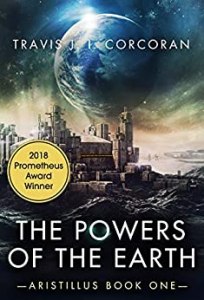By Michael Grossberg
With the annual nominations deadline for the next Prometheus Award for Best Novel now less than a month away, Libertarian Futurist Society members are encouraged to bring to our attention any eligible candidates they’ve come across.

This is a reminder and last call for nominations for the oldest category of the awards, now 47 years old.
So far, 13 2025 novels have been nominated by LFS members, somewhat less than average for Best Novel, with Feb. 15 the deadline for LFS members to nominate eligible and worthy works.
The current and interim list includes works by three authors who have previously won Prometheus Awards: Dave Freer (Cloud-Castles), Sarah Hoyt (Darkship Thieves) and Harry Turtledove (The Gladiator.)
This year’s interim slate of nominees also includes the latest novel in Karl K. Gallagher’s Fall of the Censor series, which includes quite a few novels recognized as Best Novel finalists.
But it’s also nice to see nominated works by authors who’ve never previously been recognized in our awards. So far this year, more than half of the novels were written by first-time nominees: Max Harms, Andrew Knighton, John C. A. Manley, Ewan Morrison, Laura Montgomery, Ray Nayler and J. Kenton Pierce.
So what are the novels by these authors that have been nominated so far?
Continue reading Last call for Prometheus Best Novel nominations: With the mid-February nominating deadline approaching, 13 2025 novels have been nominated so far











